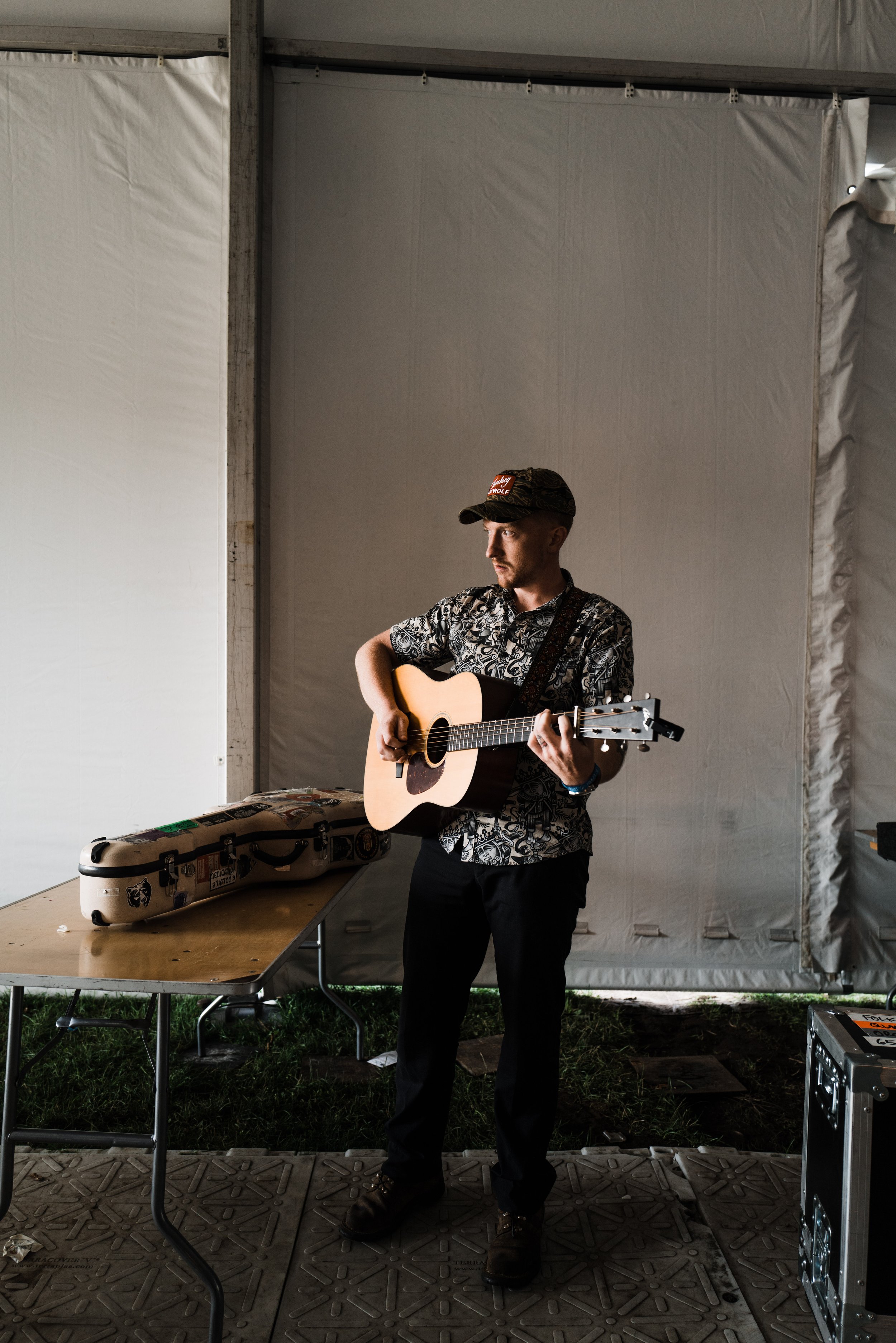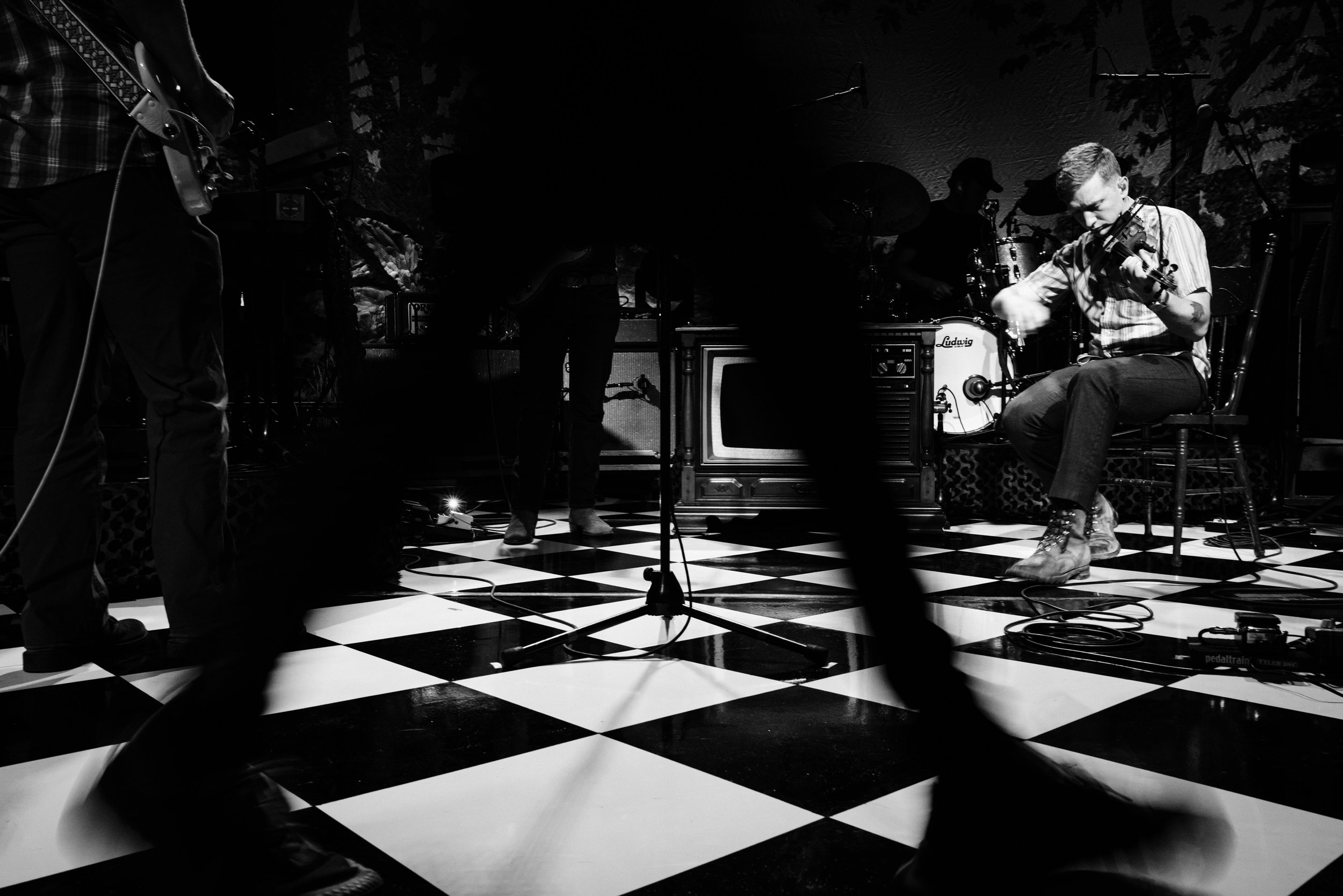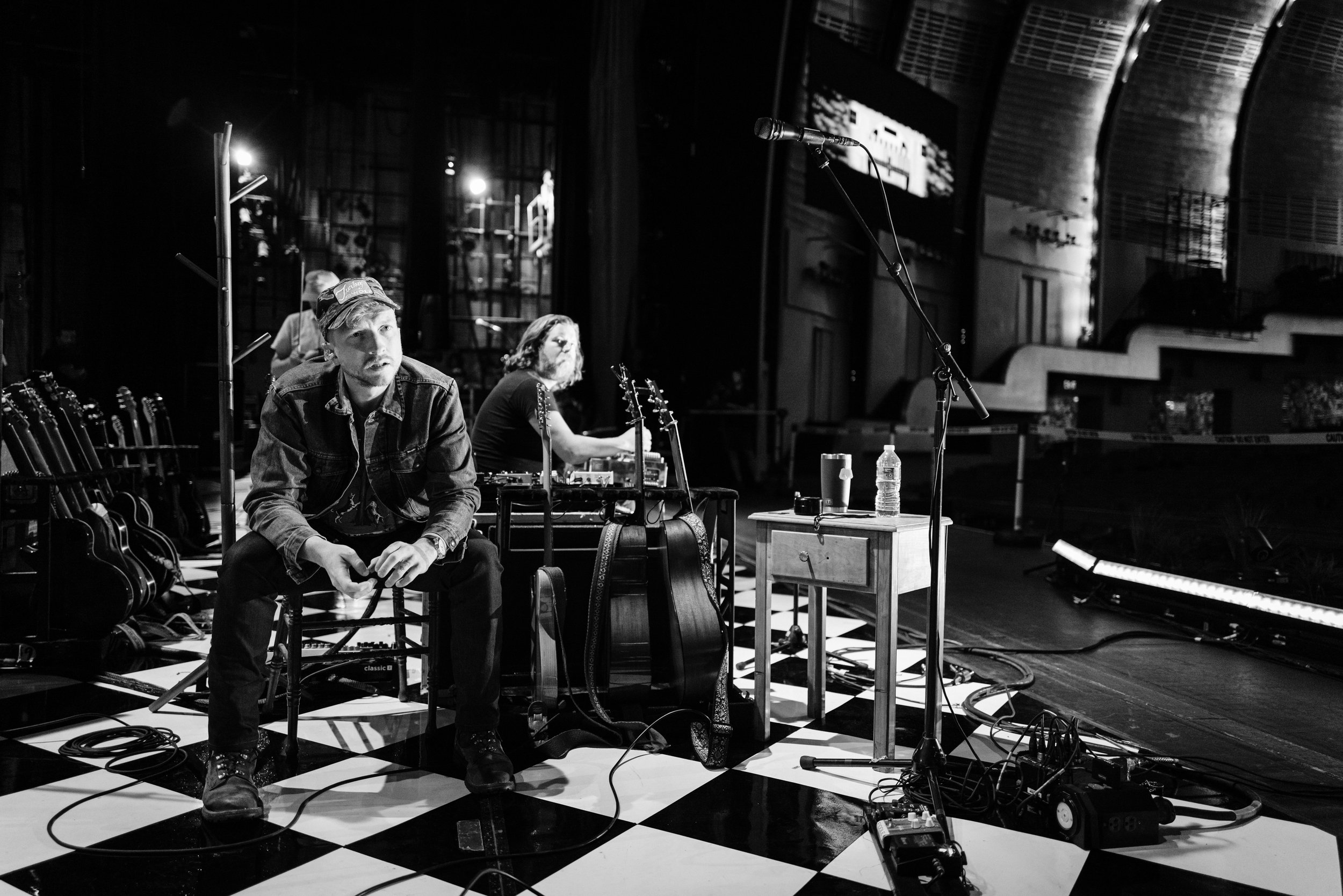After releasing a video that features a gay love story, the Appalachian musician watched many fans question whether he truly represents the region. But Tyler Childers’ new album, Rustin’ in the Rain, only underscores his rural roots — and his commitment to contributing to “the good fight.”
Story by Silas House | Photos by Emma Delevante
September 14, 2023
Tyler Childers sat alone, playing his fiddle, deep in a limestone mine near Cumberland Furnace, Tennessee. Outside, the cicadas screamed in the heat, but the mine was so cold that many crew members hurried about in coats. Childers wore a thin jacket but seemed unfazed by the chill or the activity. An occasional golf cart sped by, and a group of actors outfitted as 1950s-era coal miners marched along with picks and shovels propped on their shoulders. Everyone was there to film a scene for the video of Childers’ latest single, “In Your Love,” co-written with Geno Seale. In a moment when there were no actors or crew around, Childers slipped into the notes of “Bonaparte’s Retreat.” His eyes were open but focused on the strings of the fiddle; his face relaxed. Perhaps he was mesmerized by the rich notes of the old standard. Childers wasn’t performing this song — he was playing it for himself. That stillness on his face wasn’t concentration as much as it was peace.
The ability to find a place of tranquillity would prove helpful a couple months later, after the release of the song’s video, which portrayed the first-ever gay romance and gay kiss in a country music video released by a major label. It met an explosion of both praise — from many longtime fans and fellow artists like Brandi Carlile and Jason Isbell — and consternation from disgruntled listeners whose chief complaint was that Childers had “gone woke.”
How, they asked, had an artist who had come to represent the rural, working-class spirit of the mountain South put his stamp of approval on a gay romance? He no longer fit their stereotypical expectations of what an Appalachian singer — or person — believes and honors. Suddenly, he wasn’t Appalachian enough. They filmed themselves burning his T-shirts and concert tickets. They posted comments full of vile bigotry. They accused Childers of being gay himself, as if hurling the ultimate insult.
While there have been plenty of “really ugly comments,” Childers says that the reaction to the video has been “overwhelmingly more positive than negative.” He shares a few deeply moving messages of “people … [who] didn't really ever see themselves in the music that was constantly around them. … This is the first time that they’ve felt seen.” Childers has been especially touched by coming-out stories. “To be that encouragement that someone needs to get one step further to self-actualizing — that's the power of music, and I’m just really honored that that whole entire piece resonated in that way.”
Many celebrated him for showing the region as containing more than one kind of love story. Even more thanked him for giving them visibility in a genre where they have long been erased. Either way, Childers showed that he is going to be himself. And he has always known exactly who he is.
Unlike other country artists who sing about small towns, Childers is actually from one. In his case, the closest town to the holler where he was raised is 8 miles away and home to just over 2,000 people. The holler itself, near the tiny unincorporated community of Kise, is close to the county lines of two places that instantly gave him a country music pedigree: Lawrence County (birthplace of Ricky Skaggs) and Johnson County (birthplace of Loretta Lynn), in far eastern Kentucky.
Jacobs Pavilion, Cleveland, Ohio
Childers was born with clubfoot, a congenital disorder affecting muscles and bones that causes one foot or both to point inward and often up or sideways. He had to undergo surgeries at 8 months and again when he was 5. “So I spent a whole year in a wheelchair in a cast up to my knees … living out in the dead end of the holler.” His rehabilitation included relearning how to walk. Until he was 18, he went for checkups at Shriners Children’s hospital in Lexington, where he saw suffering among other children that was much worse than his own. “I really think that a lot of people just get to go breezing through their life without even realizing just how lucky [they] have it. But I think that small thing did give me an opportunity at an early age to realize ‘You got lucky.’”
One balm of recuperation was reading, which planted a desire to be a writer from an early age. His mother was a big proponent of books, and one of his most treasured memories of his grandfather involves reading with him.
“My pap probably never read two books outside the Bible. … And when I came on the scene, he would sit down with me and whatever book I was reading at the time. I'd read a couple pages and he'd read a couple pages. That was really something for a person who didn't take a lot of stock in books — to understand the importance of it and want to share that with his grandson and encourage that in him because he understood the power of it.”
Childers says he was a “very sensitive child” who spent a lot of time in the hills, which “definitely nurtured and encouraged an imagination that I've always had.” He was surrounded by lots of cousins and one sister. He was active in church and youth group. His religious upbringing instilled in him an interest in faith that survives to this day but also involved some trauma as a child. “I don’t think my mom and dad … went, ‘We’re going to take him on Sundays and Wednesdays and scare him to death,’ but that’s what it did.” The hell and brimstone sermons led him to worry about his own soul, and others’. Laughing, he remembers going to a steakhouse in Ashland with his father. “My dad said, ‘Why are you crying?’ And I said, ‘They’ve got beer; they’re going to hell.’”
Like most writers, Childers listens closely when spoken to and takes time to formulate his thoughts before speaking. He is quiet and introspective, but he can also be a talker who loves to share a good story and laughs with abandon. He’s still a voracious reader. In the last couple weeks, he’s read four books, including the dense and remarkable Let Us Now Praise Famous Men by James Agee (with empathetic photographs by Walker Evans), which he loved, and, on a whim, Rosemary’s Baby by Ira Levin. He always keeps at least one small notebook in his pocket, filling the pages with songwriting, poems, notes, or passages from books he admires. He’s the kind of friend who will read those favorite passages aloud to share his love or interest with others. On this overcast Sunday, he reads an excerpt from a powerful sermon he found in a book called In the Hands of a Happy God, a history of a Baptist sect.
(Left) Radio City Music Hall and Newport Folk Festival
Even when in Nashville for business, Childers sometimes looks like he is ready to go walk the land at his farm. Work boots, Wrangler jeans, and a feed store cap. Some country stars pay stylists lots of money to dress them similarly, but they can’t quite pull off the look; they don’t know how to move realistically in clothes made for climbing hills and slipping between strands of barbed wire. But Childers has been doing such all of his life. One morning when we go to a coffee shop in Nashville for breakfast, he is wearing a sharply cut linen jacket, a crisp button-down, chinos, and a pair of brown leather Sabahs. Somehow he pulls off wearing these Turkish espadrilles, too, mostly because he seems comfortable in his own skin. There is no pretense about Childers. He is not easily defined.
Nor is the sound of his new album, Rustin’ in the Rain, which was released September 8. The title track of the seven-song record includes barn-burners that allow Childers’ incredibly tight band, The Food Stamps, plenty of room to show off their talents, as well as precise ballads that let Childers use his full vocal range, including on the lead single, “In Your Love.” After a euphonious piano intro, the song opens with Childers at the top of his vocal game, singing about a cosmic love before the song continues with a ghostly synthesizer effect. By the time he sings “Honey, I will stand my ground,” the listener is hooked on this extraordinary ballad that is bound to become a wedding staple.
I first heard the song on a long drive with Childers as we ambled over the glowing green Kentucky hills on an afternoon in early spring. We had been friends for a couple years but mutual admirers of each other’s work before that. He read my first novel, Clay’s Quilt, when he was in high school and has said it helped him better appreciate his heritage; he’d later write an introduction for a reissue of the book. I have loved his music since the very beginning of his career. His wife, singer-songwriter Senora May, was one of my students at Berea College and used to bring me CDs she’d burn of him picking and singing at home.
To me, “In Your Love” announced a fuller, richer sound. I knew right away the song would take his career in a whole new direction, but I was stunned when he asked me if I’d be interested in writing a treatment for the video. Childers had only three suggestions: that Casey Campbell, an actor and musician who has appeared in all of his videos, show up in some way; that there be a scene that includes a mule; and, best of all, that it would be a gay love story. Childers has always been as close as brothers with a cousin who is gay, and he told me that he wanted his cousin to be able to see himself in a country music video.
I collaborated with my husband, Jason Kyle Howard, on the story of two coal miners who not only fall in love but also leave the toxic masculinity and industrial confines of the mines to live out an agrarian existence where they can control their own lives. I also wrote the treatment and served as the creative director on the shoot, orchestrated by director Bryan Schlam and starring Colton Haynes and James Scully, two gay actors who brought tremendous chemistry to the roles.
The video struck a nerve, racking up more than 1 million views in the first day. (As of this writing, it has more than 7.8 million global views.) The song has amassed 30 million combined streams across all platforms globally and became the highest-charting single of Childers’ career.
Childers knew he was making a statement, but most importantly, he wanted to make a piece of art.
Many who claimed to be devoted fans of Childers lamented that he wasn’t who they thought; others declared that those people didn’t understand his catalog. His last two albums, in particular, did not hold back from commenting on social issues. Long Violent History, released in 2020 at the height of the pandemic and social unrest, is a collection of eight fiddle tunes and only one vocal track, the title song wherein Childers sings about the plight of Black people facing relentless police brutality and the history of violence in Appalachia. He released a companion video to explain his reasoning for the album, saying, “We can stop being so taken aback by Black Lives Matter. If we didn’t need to be reminded, there would be justice for Breonna Taylor, a Kentuckian like me … ” referencing the young woman who was shot multiple times by police acting on a no-knock warrant. Childers used all proceeds from Long Violent History to start his and Senora May’s charity, Hickman Holler Appalachian Relief Fund.
Thompson’s point, Portland, Maine
Childers says he cannot control how people react, but the hope of making a difference buoys him. “By being vocal in the small ways that I have, it might give some of those people that are sitting on the fence wondering exactly how they should feel about it … it might push them in a direction of realizing that maybe the people around them and how they think isn't all that there is,” he says.
And he’s not about to change who he is. “To pander or cater to people that I don't necessarily agree with, politically or philosophically … that's never really steered me as an artist. It’s going to resonate with who it does, it's going to attract the people that it does, but that's just, like, a byproduct of being true to yourself.”
During the uproar over “In Your Love,” some listeners questioned how Childers could go from making a traditional gospel album to approving a video about gay coal miners. Yet Childers’ 2022 three-disc concept album, Can I Take My Hounds to Heaven?, can only be heard as a standard gospel album if one doesn’t listen to the lyrics at all. In the first single, “Angel Band,” Childers imagines a gloryland populated by “Hindus, Jews, and Muslims / And Baptists of all kinds / Catholic girls and Amish boys / Who've left their plows behind.” The accompanying video visualized the lyrics blatantly. This is the ecumenicalism that is often frowned upon by the many churches populating the mountains of Childers’ birth. The title track gives us a narrator who refuses to go to a heaven that won’t allow his dogs in with him, a direct reference to one of the holiest Hindu texts, the Mahabharata, in which the lead character reaches paradise only to be told the dog he is carrying cannot enter with him. He refuses to leave the loyal animal and is then told he can enter paradise because he has passed this test of goodness. Can I Take My Hounds to Heaven? is a radical reinterpretation of Childers’ hope for the good that faith can deliver.
Masonic Temple, Detroit, Michigan
“I've got songs about meditation … I've got a redneck commentary on reincarnation,” he says, referring to his song “Universal Sound,” which appears on his 2017 breakthrough album co-produced by Sturgill Simpson. Purgatory also includes the title song that explores Catholic and Protestant principles, including lyrics such as:
I've been up on the mountain, and I've seen His wondrous grace
I've sat there on a bar stool, and I've looked Him in the face
He seemed a little haggard, but it did not slow Him down
He was humming to the neon of the universal sound
“For anyone to think that I've veered off in some direction that I've never been on … [they] weren't digesting those lyrics,” he says.
This is not to suggest that his music hasn’t evolved. In the beginning of his career, he was often seen as the Everyman with “women up and down this creek,” as he sang in “Whitehouse Road.” He was the local boy who sang about coal, whiskey, and Hank Williams. He loved to party but also became known for his songs of deep devotion. Over time, his writing became more abstract and complicated, whether it was meditating on “the universal sound” or demonstrated in his ballads, such as his widely acclaimed, intricate love song “Lady May.” Lately, his identity has become that of an uncompromising artist, one who lets his art speak for him. He rarely gives interviews, and when he’s not touring, he prefers to spend time on the farm he shares with his wife and son in eastern Kentucky, shunning red carpet events and the Nashville skyline as much as he can.
“I'm getting older. Every day the gravitational pull to the grave is just inevitably getting heavier,” Childers says, at the ripe old age of 32. “I'm trying to be a better person, to grow up. That effort has been sped up [by] … realizing that I wasn't being the best version of myself that I could be,” he says, making reference to the time before he became sober. “Quitting allowed me to move on and grow as a person. And then, having a kid and realizing I want to be present for him.”
Radio City Music Hall
As he talks, his nearly 1-year-old son is playing happily at his feet. Childers reaches down to graze the top of the boy’s head with his middle knuckle. “I want to be a good father. I want to be a good person, because I don't want to be a bad example for him. I want him to be a good person. I want him to have a good example of that and I want to be that for him. I can't do anything about the catalog of drinking-and-drugging songs that I've done … but I can be active in allowing that catalog to show a progression as a person, because that is what art is, it's an artistic expression of the human experience.”
Childers says he embraced himself more as an artist right around the same time he realized he had to get sober or he was going to lose everything. He came home after weeks of hard partying on tour and realized he had reached a low point. Even though he was on the road working to create a home and build a family, he could barely function on his one day at home. “All you can do is just nurse a hangover, and Senora doesn't even want to be around you … and rightly so.” He pauses for a moment. “If I would continue to drink — especially in the way that I was — she wouldn't have stayed with me. She shouldn't have stayed with me. I'm extremely blessed that she had the patience … to put up with my shit as long as she did.”
Childers quit drinking and began to think of his music in a deeper way. “I started taking more stock in or taking myself more as an artist with the last couple albums, starting to understand, the more success that you have with putting yourself out there, the more that it really hits home.”
The Salt Shed, Chicago
When the pandemic forced him and The Food Stamps off their relentless touring — often upward of 250 days away from home — he settled into the farming life with Senora. They raised a huge garden and spent time moving into a cabin that they gave a deep clean, allowing him hours to study and write new songs that would make up most of Rustin’ in the Rain. The album also features covers of the classic Kris Kristofferson composition “Help Me Make It Through the Night” and fellow Kentuckian S.G. Goodman’s “Space and Time,” which he calls a “timeless” song.
The originals “all came from waking up and being home with Senora,” he says. The album is for her, he tells me, but instead of a blatant dedication, he included a beloved Wendell Berry poem called “The Wild Rose” in the liner notes. Some interpret it as being about a soul mate, while other readers take it as a meditation on faith.
Recently, he and his team have overhauled the way they go out on the road; they do two-week jaunts throughout the whole year. “Moderation,” he says. “I get to the end of a two-week run and like, ‘That was fun. That was rewarding. It was fun musically. It was fun performative-wise, and now I’m ready to go home.’”
Radio City Music Hall
Childers has built a career for himself that is allowing him to take more artistic chances and tell more of the stories that are important to him. When asked what he’s most proud of so far, he doesn’t hesitate. “I've never had to compromise my art in any way. I've always stayed true to myself.”
Childers is an artist, and at some point a true artist almost always ruffles feathers. When you’re from rural Appalachia, there is an expectation that makes that even easier to do.
What is Appalachia? What does it mean to be “country”? And Lord, the ultimate question: What is real country music? Entire conferences are held to try to answer these questions. Universities have departments dedicated to studying Appalachia and classes to dissect country music. I am leery of easy definitions. Too often a suggestion of what a particular region or culture is can easily lead to generalizations that simplify rather than complexify.
To suggest that everyone in Appalachia is humble and goodhearted is, in its own way, just as simplifying as saying that everyone there is barefoot and illiterate. One is more insulting than the other, of course, but both examples lack nuance. I don’t believe Appalachia can be defined, but I do think it is a constant contradiction.
Live Oak Bank Pavilion, Wilmington, North Carolina
Appalachia is a place of stunning natural beauty and sickening environmental devastation. It’s a place where many carry on cultural traditions while others have forgotten the old ways. Appalachia is a culture that prides itself on being loving: Hugging someone you just met is the norm, as is taking in a cousin who needs raising, pulling over to help a stranded motorist, or carrying your extra garden yield around to give to your neighbors. Yet it’s also a region that continues to vote in large numbers for politicians and policies that are often discriminatory and exclusionary, making many people of color and LGBTQ people feel unwelcome or even unsafe. Some flee, homesick and weary, while others stay and fight. The region is one where environmentalists who fought for an end to mountaintop removal still sit down to holiday meals with family members who continue to insist that coal is the only thing the region has. I sit at such a table frequently.
Appalachia is a place of many different dialects, vernaculars, and cadences. We may not have as much diversity as the rest of the country, but we are not all alike, either, and we’re certainly not all white, straight, cis, or Christian, as many people around the world might think. The same could be said for rural America, no matter where it is in the nation.
But if one thing binds rural people and Appalachians, it’s being proud of one of our own when they make it big. And Childers is undeniably one of the most successful artists working today. His music has amassed more than 4.4 billion global streams and views. He has two Grammy nominations, four platinum singles, one platinum album, a gold album, and a gold single. Four of his albums have reached the top 10 on the Billboard country charts, with one of them, Country Squire, debuting at No. 1. He’s sold out the likes of Radio City Music Hall, Red Rocks Amphitheatre, and the Ryman Auditorium. And he’s become a representative of his homeplace whether he wants to be or not.
“I definitely didn't get into playing in bars because I thought … one day I get to be this cultural figure. That's not what I was striving for,” he laughs. “I do feel a bit of responsibility. I do have hopes for the way the world could be. I do have ideas and thoughts about that, and I have a vehicle through my art to help influence that. And just little contributions towards that with Long Violent History and the music video that accompanies ‘In Your Love’ — those are small ways that I can contribute to the good fight.”
Appalachia is a place ripe for possibility and evolution, for transition and — if you’ve found one of its thin places atop the jagged rocks at its highest peaks, or on one of its elders’ porches, or standing in one of its rushing creeks — even transcendence. Spend some time in these hills and hollers, in these Appalachian cities, and if you look and listen closely enough, you’ll find multitudes. You’ll discover complexity.
You’ll hear Tyler Childers.
Silas House is the New York Times bestselling author of seven books and the poet laureate of Kentucky. His latest novel, Lark Ascending, won the Southern Book Prize and the Nautilus Award and is currently a USA Today bestseller.
Emma Delevante is a photographer whose concert, editorial, advertising, and portrait work has been published by Rolling Stone, The Tennessean, and Relix Magazine — and seen on billboards of the Country Music Hall of Fame in Nashville and nationally on campaigns for artists such as Tyler Childers and Billy Strings. Her photography and production credits include award-winning films, ad campaigns, and album artwork.
More from The Bitter Southerner















